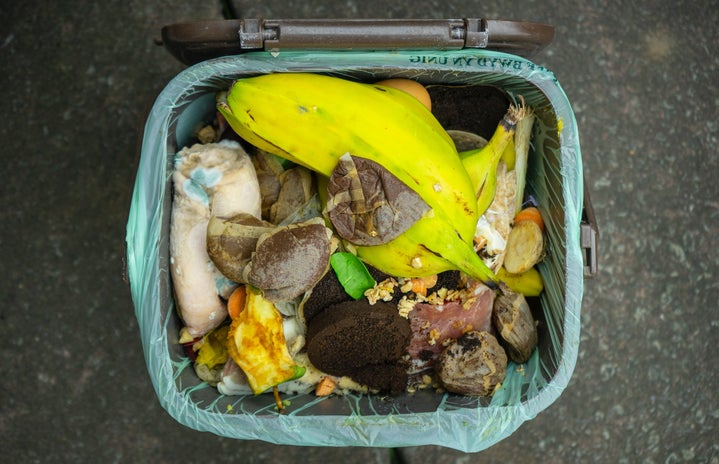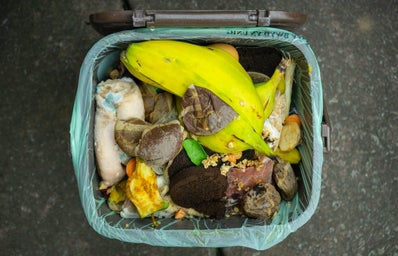A lot has changed since the days of the 3 “R”s; as a collective, we now strive not only to reduce, reuse, and recycle, but also to refuse, to rethink, to repurpose, and, increasingly, to rot. In fact, the City of Ottawa has just approved a plan to mandate green bin access for all multi-residential property tenants by 2023. If you’re lucky enough to have a landlord (or parent) who currently allows composting, then congratulations! You’re already one step ahead.
But are you composting as well as you could be? We hope these tips will help you to use your green bin just a little bit better than you already do. And if your building doesn’t yet participate in the green bin program, save these tips for when it does!
Let’s begin.
- Purchase 100% cotton swabs and cotton balls.
-
Yep, these can be composted! But only if they’re 100% cotton. Go for brands like Quo Beauty, Equate, Selection, Compliments, Q-tips, and President’s Choice. We recommend keeping a green bin in the bathroom as an extra reminder to dispose of these responsibly.
- Find out which paper products are compostable.
-
Start with paper towels, plates, and cups. Then, branch out to shredded paper, and flour and sugar bags. When COVID-19 is no longer a concern (which, hopefully, will be v soon!), you’ll be able to compost your used tissues, too. Save your waxed and parchment paper for the garbage, unless the label tells you otherwise.
- Learn About Plastic PRoducts, Too.
-
Some companies, like Ziploc, have recently introduced biodegradable plastic products, making it essential now more than ever to double check whether your plastics are recyclable, biodegradable, both, or neither.
- Remove produce stickers and elastics.
-
Although often overlooked, this small step can make a big difference. Theoretically, compost stickers could (and also lowkey should) be made from biodegradable materials, but, until that day, we’ll just have to remember to remove them before tossing our fruit peels in the green bin.
- Know which tea bags to put in which bin.
-
Contrary to popular belief, not all tea bags are biodegradable. Consult this chart and this list to find out where your favourite brands sit in terms of biodegradability. If you aren’t brand-loyal, this information could also serve to inform your future purchasing decisions.
- Compost wood.
-
Not the kind that you find in the garden (that can go in yard waste). Here, we’re referring to household products made from untreated wood (think: toothpicks, popsicle sticks, wood shavings, and single-use wooden spoons).
- Check your takeout containers.
-
In 2021, a Canadian law was passed to ban single-use plastics in takeout containers. And while many restaurants have transitioned to recyclable materials, others have opted for biodegradable options. Look for a symbol or label that indicates how to dispose of each piece of packaging, and hold on to your containers until you find an appropriate bin.
- Compost coffee grounds and filters.
-
Pretty much all coffee filters are 100% paper, which—yes!—means they’re compostable. It’s always a good idea to double check, though. And if you’re still using K-cups? Maybe… don’t? There are much more eco-friendly alternatives out there.
- Swap out regular floss for silk floss.
-
Because you do floss… right? Silk floss is a biodegradable and affordable alternative to regular floss that keeps your mouth just as clean and healthy. You can find silk floss at most environmental grocery stores (plus a few regular ones), and online.
- Chop up your natural wine corks.
-
Make it an environmental wine night and chop up your wine corks to be composted at the end of your festivities. This only goes for natural wine corks, though; synthetic wine corks aren’t biodegradable. You’ll know a cork is natural if it looks like pressed wood (whereas synthetic corks look like rubber).
- Save your dryer lint for garbage day.
-
Don’t fall for the myth that dryer lint can be composted; unless all of your clothes are 100% biodegradable (which isn’t likely) dryer lint is, in fact, not compostable. Most clothing contains microplastics, which, when placed in the green bin, can interfere with the biodegradation of other materials.
Still not sure whether to put something in the green bin? Don’t guess! Similar to wish-cycling, green-bin-guessing often has the opposite effect of what you’re going for. Read the packaging, look it up, ask a friend—or simply place your waste in the trash, and make a promise to yourself that you’ll find out how to best dispose of it for next time.


